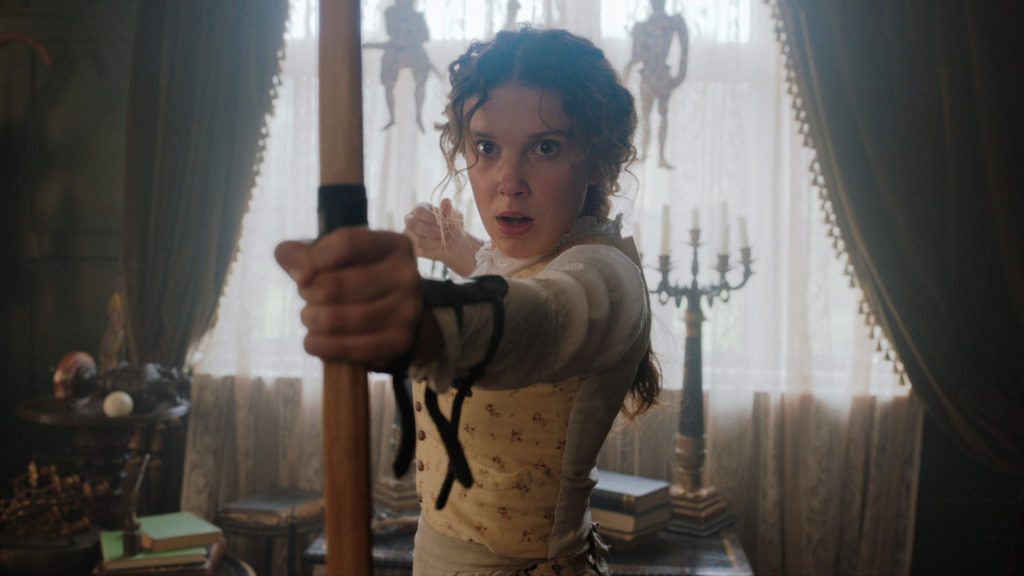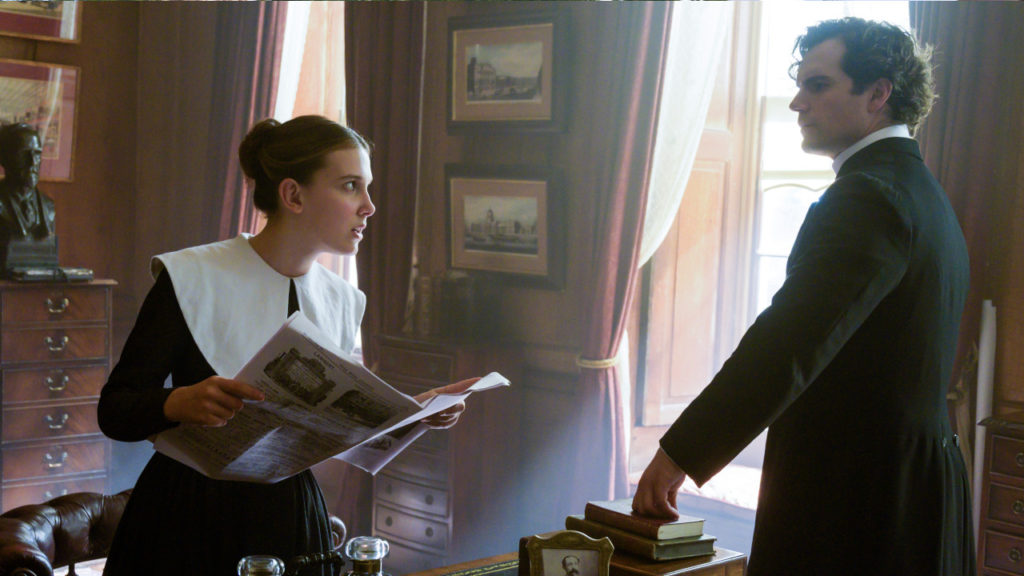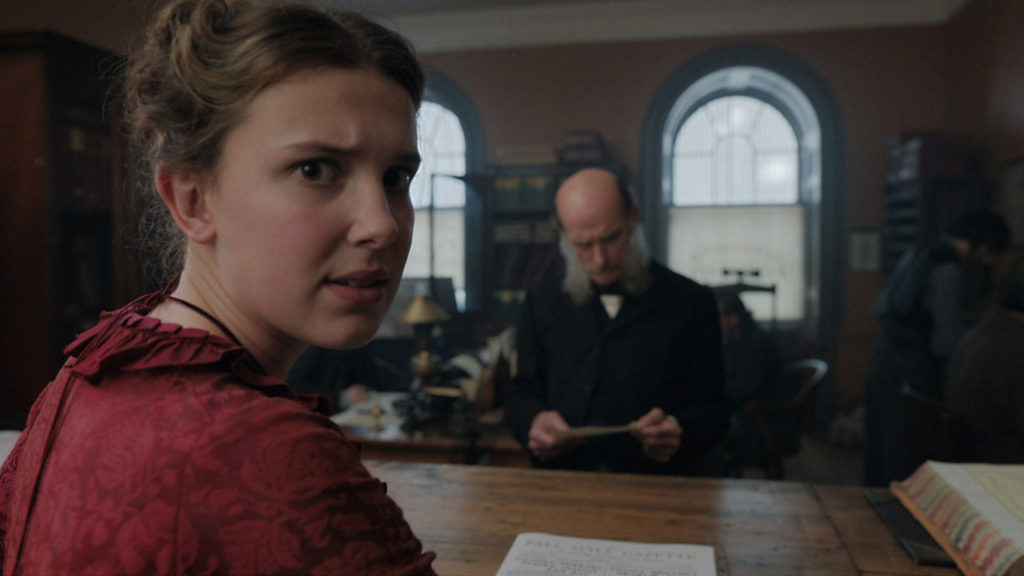There’s a point in Enola Holmes, where our 16-year-old heroine, hot on the trail of her missing mother, is urged to stay in London on her own terms. To be tough and stay, not because she is looking for someone, but so she can find herself. What’s more, it’s advice that she more or less follows.
It’s an unexpected plot wrinkle in a film that is loaded with enjoyable surprises.
Initially appearing to be yet another Netflix YA adaptation with a “strong female character,” a vehicle to keep Millie Bobby Brown occupied between seasons of Stranger Things, Enola Holmes turns out to be an exciting, funny, and inventive adventure.
Enola Who?

The titular Enola has lived a sheltered, if highly educated existence, at her family home in the company of her mother Eudoria (a glowing Helena Bonham Carter). Her brothers Mycroft and Sherlock having left to find their own paths in the world after their father passed away. In the England of 1884, it’s a path that’s not easily available to Enola.
When her mother disappears one morning, apparently without a trace, it’s up to Enola to track her down. She also has to contend with the machinations of her brother and ward Mycroft who, much to her chagrin, plans to banish her to a finishing school for young ladies in preparation of marrying her off. Thankfully she has her family’s nose for investigation/deduction and a fat stack of cash left by her mother and is soon hot on Eudoria’s heels. Her quest is slightly sidelined by the misadventures of a charming runaway, Viscount Tewkesbury the Marquess of Basilwether (Louis Partridge), but this never strays from being Enola’s tale.
And what a fun, insightful end-of-summer romp it is.
Millie Bobby Brown is great as the titular Enola, a role she probably chose as producer to get away from the sullen, uncommunicative Eleven in Stranger Things. Her effervescent delivery, frequent fourth wall breaking asides, eye rolls and banter with Louis Partridge as the Viscount Tewkesbury, are a joy to watch.
She also gets her hands dirty in multiple fight scenes, most memorably with Burn Gorman’s “boo-hiss” villain. One fight scene contains what might be my favourite action beat of the summer as someone who’s being forcibly held underwater finally tries a move I’ve always wondered about.
The film is peppered with moments like this. Clever little surprises that mark it out from its, some admittedly very good, YA peers.
Too often, scripts fall back on giving characters advance knowledge of events or repeatedly telling the audience the main character is smart, but Jack Thorne’s script, based upon Nancy Springer’s novel, avoids this pitfall by actually being clever.
It Says Here You’re Some Kind of “Super-Man?”

In a great moment, when confronting Sherlock, Enola cleverly admonishes him for being emotional, even though it’s completely understandable under the circumstances. It’s a brilliant reversal of the type of line usually used to dismiss women in similar circumstances. Enola gets to say it first though, changing the dynamic, and stopping Sherlock dead in his tracks.
Henry Cavill and Sam Claflin are more than able to exorcise any impressions of past Sherlocks and Mycrofts, in performances that are much more than cameos.
There’s another absolutely fantastic moment where Susan Wokoma’s Edith, a Black woman, martial artist, and tea shop proprietor in England in 1884, absolutely demolishes Sherlock’s worldview and privilege, by pointing out that his protestations of how bored he is by politics, merely highlight how little interest he has in changing a world that suits him so well.
Enola Holmes is all about changing that world. About what gets changed and who gets to take part in those changes.
Perhaps due to the proximity of Enola Holmes’ release to that of another story of a young woman finding a way in the world, Disney’s Mulan, I couldn’t help but compare the two. Disney’s remake comes out less favourable in a myriad of ways.
Both young women are highly skilled in certain areas but not wise in the ways of the “Man’s World” they live in. Unlike Mulan’s “chosen one” narrative however, Enola has to work at developing her super skills, (detection, deduction, and Jiu Jitsu). Unable to rely on her “massive chi,” Enola has to work on her martial arts moves throughout the film, often failing. It’s a lot more satisfying to watch than Mulan’s all powerful Jedi.
“I Cant Believe That Was the Best Heading He Could Come up With.”

Rather than disguise herself as a man to evade detection, Enola’s main disguise is a different class of slightly older woman, throwing off Mycroft’s efforts to track her down thanks to his blinkered view of her character (although Enola still frequently swaps clothes with men to go undetected when she needs to).
While Mulan gains the acceptance of her family, and all of China, after her adventure, Enola still has rampant sexism and classism to face.
Apparently Legendary pictures plans to have her face them again. While the film provides some emotional closure to her Mother’s disappearance, many aspects of Enola’s case are left tantalisingly open. It’s not a sequel baiting cliff-hanger ending though. The film ends in a manner just as satisfying and enjoyable as the rest of it.
Will Enola Holmes return in The Case of the Left-Handed Lady?
Based upon this first adventure, I certainly hope she does.
Enola Holmes
123 mins
Director: Harry Bradbeer
Writer: Jack Thorne
Story: Nancy Springer
Cast: Millie Bobby Brown, Louis Partridge, Henry Cavill, Sam Claflin, Helena Bonham Carter, Fiona Shaw, Adeel Akhtar, and Burn Gorman.









Follow Us